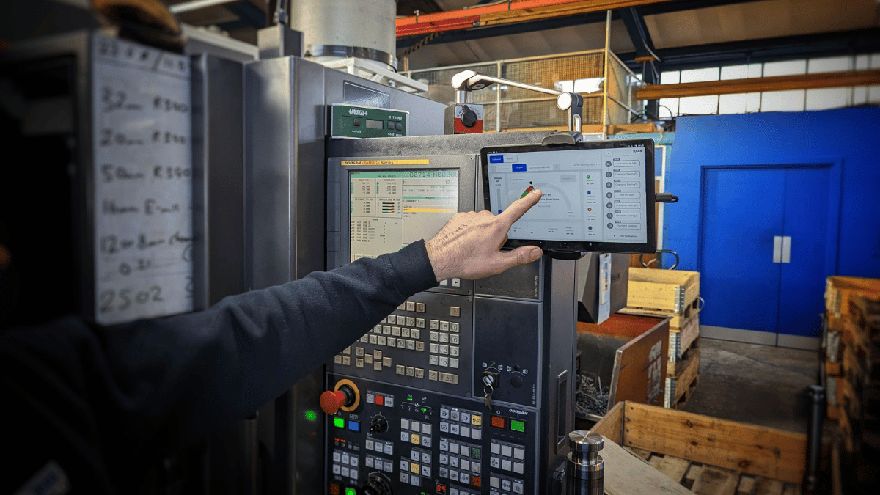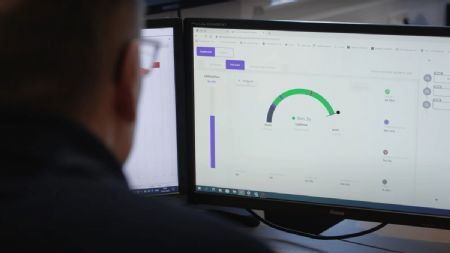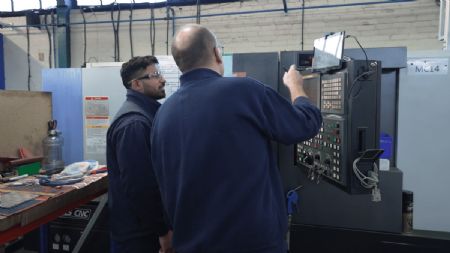
Digital literacy and data engineers are key to manufacturers unlocking the potential of data for their businesses, says the director for industrial digitalisation at the
University of Sheffield Advanced Manufacturing Research Centre (AMRC).
Professor Rab Scott delivered the message at
Power of data and digital in industry, an event held at
Barnsley Digital Media Centre to explore initial outcomes and learnings from
NextGen, a project to embed low-cost digital technologies in manufacturing companies around South Yorkshire and Wales to drive productivity into regional manufacturers through digital technology adoption and skills development.
FourJaw’s co-founder and CEO Chris Iveson and
Connexin’s Rikki Coles also spoke at the event, and together with Professor Scott they made a powerful case for how adopting a digitally-focused culture — and unlocking the power of data — can help productivity, save energy and reduce waste.
Professor Scott said ‘digital literacy’ is a crucial first step for manufacturers who want to start their digital transformation journey — and that step is one NextGen can help them take with confidence. He told delegates: “An awful lot of companies are still confused about whether they need a data scientist or a business analyst — it is about digital literacy as the first step.
“Digital literacy is more about understanding what digital skills you need to go and get rather than having those skills yourself. There is a desire and demand for this sort of training and introduction, which we are offering through NextGen. We are not going to give you a finished data scientist in six or ten weeks, but at least manufacturers will understand what they need to go and invest in.”
Professor Scott, who is also chief engineer for digital manufacturing at the High Value Manufacturing Catapult (HVMC) network which covers the whole of the UK, warned that as analytics tools continue to become more commoditised — data engineers with domain knowledge will be absolutely critical in looking at, and understanding, a company’s data.
Professor Scott said: “When we started to talk to the 10 companies that signed up to NextGen and asked them what they really wanted — they were not quite sure and thought it was a data scientist. But they need to start not with data science but with data engineers.

“There is a subtle difference. With data science, you take a prepared data set and try and analyse that. But the challenge there is what if you have captured the wrong data, what if it is structured in the wrong way, what if the data has got holes in it, what if it has not been cleaned, what if it is biased?
“You can analyse all you like but if you have not got the right data, in the right format, you still will not get any answers of value. The true skills are about data engineering — knowing what data to capture, knowing how to capture, knowing how to structure and knowing how to begin to cleanse it and then to actually analyse it.”
Competitive advantageThe idea behind NextGen, which is funded by
Innovate UK and run by the AMRC, is to enable businesses to leverage a competitive advantage by extracting meaningful insights from data, moving them from a reactive to a predictive business model and helping them to use digital innovation to boost productivity and push towards ‘net zero’. It also seeks to lower the barrier to data science and develop ‘digital champions’ in those businesses.
In the first cohort 10 companies took part — Stanley Black & Decker, Sterling Machining, ELE Advanced Technologies, ARMEG, CW Fletcher, Cooper & Turner, Sylatech, Magellan Aerospace and Henllan Bakery.
They each received a package of support centred around four key areas: FourJaw’s IoT hardware and analytics software to monitor machine usage and productivity; skills support through a six-week data science course provided by
EyUp Skills Academy; tailored business support from Sheffield-based digital tech company
Razor; and networking support through a ‘hackathon’ event.
Mr Iveson said eight of the 10 companies that signed up to NextGen were new to the company. One of those taking part is precision machining firm,
Sterling Machining, which specialises in the extrusion tooling and sub-contract machining industries and proudly cites the shaft which closes Wembley Stadium’s roof as one of the products it manufactured.
Sterling Machining was already using FourJaw’s machine monitoring platform on six of its CNC machines, supporting and informing its continuous improvement strategy by driving efficiencies across its factory floor. Through NextGen, it added the FourJaw kit onto another four machines and has since applied it to two more.

In a case study video shown by Mr Iveson, Sterling Machining explained how it had seen a number of commercial, process, cultural and efficiency improvements since deploying FourJaw across its factory floor, including improved machine usage, going from 70 to 100% in some instances. Other benefits included having more confidence in quoting and understanding what work is most profitable; making informed commercial decisions about hiring resources and buying new machines; understanding the actual time spent on jobs; encouraging friendly competition between machine operators; and improving processes.
In a report by Razor, early findings from
NextGen show that every company interviewed was experiencing difficulties around utilising different data sets, with 80% having direct challenges in how to actually begin utilising data. Almost two-thirds also said they were struggling to collect the ‘right’ data, or identifying what the right data is.
Significant opportunityFrom the first cohort, 80% said they saw significant opportunity in developing or acquiring new software and systems for their businesses that could solve pains around specific areas of manufacturing such as scheduling, process monitoring, and tooling and breakdown.
The report also shows that 60% of the companies interviewed saw a significant benefit in having specialised dashboards to provide KPIs; while another 60% saw a significant opportunity and benefit in having a central data warehouse that receives and stores a plethora of different accurate data sets.
Early learnings for the i>NextGen delivery team included being realistic with timescales and not doing too much too quickly; understanding that companies do not always value support which is ‘free’; and that there is still nervousness about Industry 4.0 technologies especially with respect to cyber and data security. These learnings will be used to change and flex the delivery style of the support for future cohorts.
A second cohort of the data science course will take place in the summer, funded by the i>NextGen project, and delivered by EyUp Skills Academy.
For more information or to discuss how NextGen can help your business, email Jon Stammers, AMRC theme lead for data, connectivity and AI, .